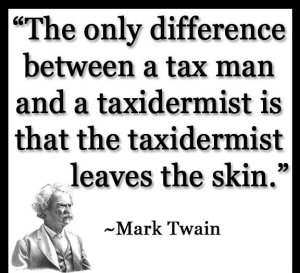 The next time you see any of the following Senate Republicans:
The next time you see any of the following Senate Republicans:
Lamar Alexander (TN), Roy Blunt (MO), John Boozman (AR), Richard Burr (NC), Saxby Chambliss (GA), Dan Coats (IN), Thad Cochran (MS), Susan Collins (ME), Bob Corker (TN), Mike Enzi (WY), Deb Fischer (NE), Lindsey Graham (SC), Chuck Grassley (IA), John Hoeven (ND), Johnny Isakson (GA), Mike Johanns (NE), John McCain (AZ), Rob Portman (OH), Jeff Sessions (AL), Richard Shelby (AL), John Thune (SD), Roger Wicker (MS)
Ask them why they joined tax–and–spend Democrats and voted for the disingenuously named “Marketplace Fairness Act” that expands the size of government and extends crony capitalism by allowing states to force online and mail order retailers to collect sales tax from shoppers that don’t live in the state where the retailer is located.
When does a conservative philosophy include coercing retailers based in a state with no sales tax into collecting sales tax for states that do? How can the laws of Virginia apply to a company doing business in New Hampshire?
As of now a state can only require a company headquartered elsewhere to collect sales tax if the firm has a physical presence (a store, warehouse, distribution center) in the state that wants the tax collected. Obviously Wal–Mart, Sears, Home Depot and so on already collect sales tax because they are located nationwide. Amazon and eBay only charge sales tax in California where they’re located and a few states where distribution centers are located.
Consumers who buy from out–of–state online stores are supposed to send a check to their state revenue service each year in the amount of sales tax they would have paid locally, but the honor system for tax payments does not seem to be working.
States could withhold a percentage of your paycheck each year to cover the estimated amount you would pay in online sales tax. (Does term ‘withholding’ ring a bell?) At the end of the year you could file a return with receipts from online purchases and if you spent less than the state estimated, you would get two refunds, instead of just one!
Somehow state politicians don’t think this idea would be too popular. Instead they want the federal government to force online retailers who don’t have a location in their state, don’t use any services in their state and don’t have any representation in their state to collect taxes for their state. And if they don’t, the state will seize the company’s property through court proceedings in a state where the company isn’t located. It’s remote control taxation without representation.
I can understand why Democrats support this, it’s right up their alley. What I can’t understand is how a Republican that’s supposed to support limited government can vote for it. The rationalization they use is “fairness,” which is the handmaiden of “share the wealth.”
Proving he can string clichés with the best of them, Sen. Enzi says, “This bill is about fairness. It’s about leveling the playing field between the brick and mortar and online companies and it’s about collecting a tax that’s already due. It’s not about raising taxes.”
So the fact you will now be paying more tax is just an unfortunate byproduct that can’t be blamed on Enzi.
I’m with the folks at Catholic Online who describe the bill thusly: “There’s nothing fair about a tax whose sole purpose is to punish businesses that employ an efficient business model. The tax does nothing to improve consumer choice, rights, or value. It’s another case of big business using its influence in Washington to compete by legislation against small, private retailers.”
Enzi can spout “fairness” all he wants, but the bill is about revenue.
This bill will cripple smaller online operations that have created a niche business on eBay. The magnanimous potentates in the Senate have graciously agreed to exempt businesses that don’t gross $1 million in yearly sales, but that just proves how ignorant politicians are regarding the market. A business that grosses $1 million might net 10 percent of that amount if they’re lucky. There’s no room in $100,000 to hire someone to manage sales tax collection for the 50 states.
The bill also requires states to provide “free” software to help retailers become revenuers. We all know how well that’s going to go. For a look at Virginia’s adventures in software see here. And if the state can’t get the software to work, there’s no penalty. But if the company can’t get the software to work it wins a nice tax lien.
This bill is crony capitalism attracting Republicans who confuse being “pro–business” with being “pro competition.” They are dupes of businesses that want to limit competition rather than compete.
Local retailers already have an advantage over online retailers. The product is in stock. The customer can examine it. If the customer has a question, there should be an informed salesperson nearby ready to provide information (I realize you can fire a howitzer in Wal–Mart, Sears, Best Buy, Home Depot or Costco and not hit a salesperson, much less an informed one, but we’re talking an ideal competitive situation here). Even better there are no shipping charges when one buys locally. And if the product is defective or the buyer changes their mind, it’s returned locally.
Meddling in the market on behalf of favored businesses is second nature for Democrats, but you would think GOP members would know better. Here in Washington, DC an out of control city council is busy writing regulations to ruin the business of lunchtime food trucks in downtown DC. The justification is identical to that of the “Marketplace Fairness Act.”
Brick and mortar restaurants are complaining that food trucks are stealing customers and they don’t have to pay property taxes like the restaurants do. Sound familiar? But even if the council banned food trucks altogether — and with this council you never know — there would not be a boost in lunchtime restaurant business because the restaurants and the food trucks serve a different customer base.
Food truck customers are in a hurry. They line up; they grab the food and head back to the office. Or sit on a park bench and fight the pigeons and the homeless for their fish taco. The food trucks don’t take credit cards and the prices aren’t all that cheap. But the process is faster than a sit down restaurant and there’s no tip.
If food trucks vanish, customers will bring their lunch or visit a deli or sandwich shop that is faster than a restaurant. They won’t be filling a table at whatever uppity lunch spot is hot this month.
A conservative would hope the “Fairness” the bill is DOA in the House, but there are dupes everywhere. Rep. Steve Womack (R–Wal–Mart) explains, “Obviously there’s a lot of consumers out there that have been accustomed to not having to pay any taxes, believing that they don’t have to pay any taxes. I totally understand that, and I think a lot of our members understand that. There’s a lot of political difficulty getting through the fog of it looking like a tax increase.”
If the esteemed representatives really want to “level the playing field” with online merchants, then lets go all the way. Charge the sales tax but require local merchants to make the following changes:
- Customers in the store can’t actually hold the merchandise; instead they must examine a series of small photos.
- If customers have a question regarding a product, they are required to email or call customer service for information. Hold time must be at least five minutes and you have to press three numbers to guarantee an answer in English.
- Customers won’t be able to get buying advice from salespeople, but they can go through a box of 3X5 cards filled with poorly spelled recommendations from anonymous random people who may or may not actually own the product.
- Customers may buy the product at the store, but they must wait five days to pick it up and they must pre–pay a pickup fee. If the customer wants the product sooner, they must pay a larger pickup fee. In no case can the customer get the product in less than 24 hours.
- If the product is defective or the customer changes their mind, they must ship the product back to the store, rather than take it themselves.
Brick–and–mortar stores with high prices and disinterested staff deserve to lose out to online merchants. It’s what happens in a competitive marketplace, unless Big Government politicians start interfering.
